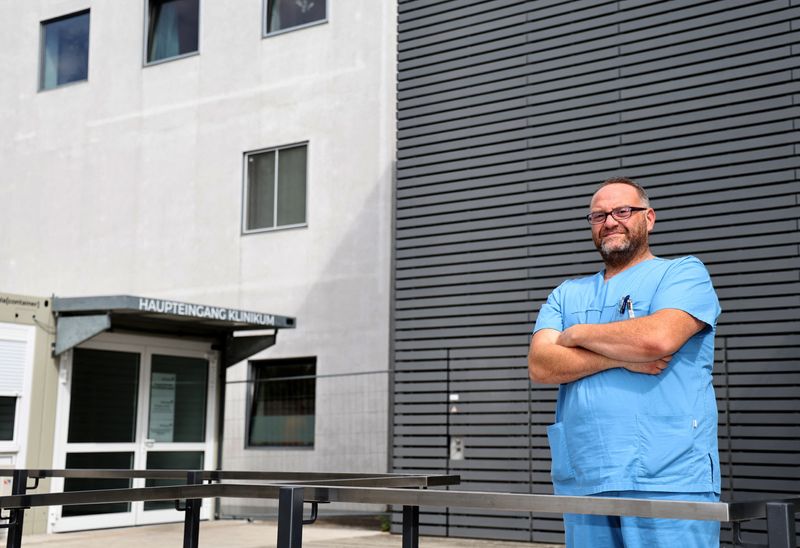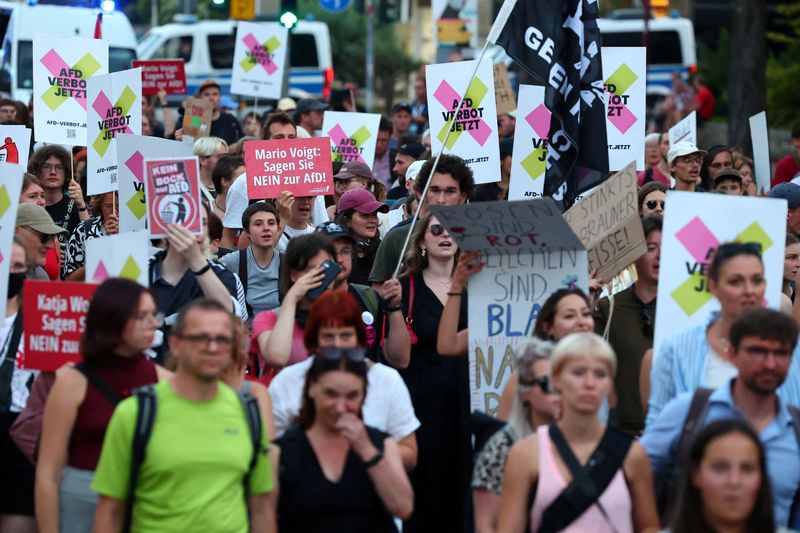By Riham Alkousaa
BERLIN (Reuters) - Syrian doctor Humam Razok felt relief when he arrived in Germany nine years ago after fleeing Damascus, where he had been jailed twice for his political beliefs.
But the far-right AfD party's victory in an election on Sunday in the eastern state of Thuringia where he lives, and the daily racism he says his wife encounters, have convinced him to leave the state once she graduates.
Razok, 39, fears racism will worsen in Thuringia even if the Alternative for Germany is unlikely to be able to form a government because other parties refuse to work with it.
"It's like having a huge mole on your face as you walk down the street - people look at you in a strange way. We are still seen as new or unfamiliar to them," Razok said.
He was one of more than 10 migrants Reuters spoke to in Thuringia. All shared experiences of racism and said they were anxious about the rise of the far-right.
The nationalist, anti-migrant AfD won nearly 33% of votes in Thuringia and came a close second, with over 30% of votes, in neighbouring Saxony. It is the first far-right party to win a state legislature election in Germany since World War Two.
Razok quickly learned German following his arrival from Syria, and works as an anaesthetist at a hospital near the state capital of Erfurt. He says he is respected by patients and is satisfied with the atmosphere at work but that his wife, who wears a headscarf, faces racism every day.
"I am very careful on the street. If I speak Arabic with my wife, I try to keep it down or switch to German if someone is close by," Razok said.
He said he was not surprised by the AfD's election success but was disappointed, and that its rise had emboldened some of his work colleagues to openly voice support for the party.
Other migrants he knows in Thuringia, where foreigners make up 7.6% of the population, are also afraid, Razok said.
"Only a minority (of them) still want to live here," he said, adding that he plans to move to one of Germany's western states once his wife graduates as a pharmacist.
Skilled workers are desperately needed in Thuringia, where more than three in four healthcare vacancies could not be filled with a suitable applicant within a year, according to data compiled by the IAB labour market research institute.
If this trend continues, it could exacerbate the labour shortage in Thuringia, where the number of employed people is expected to shrink by about 20% by 2040, twice the national average, according to an study by the Bertelsmann Foundation.
MIGRATION TRAUMA
Nearly half the people who voted in Thuringia supported either the AfD or the Sahra Wagenknecht Alliance (BSW), which also called for tighter asylum policies and won 15.8% of votes.
German Finance Minister Christian Lindner blamed the outcome on the federal government's migration policy, saying Germans were fed up with the fact that the government may have lost control of immigration and asylum.
A deadly attack by a Syrian asylum seeker in the western city of Solingen a week earlier had intensified voters' concerns about unregulated migration, said Hermann Binkert, head of the German Institute for New Social Answers (INSA).
"Also, there is still a bit of that trauma from 2015," he said, referring to the impact of former Chancellor Angela Merkel's decision in 2015 to allow over a million asylum seekers to cross the border into Germany.
The Solingen attack prompted Germany's federal government to introduce measures to tighten asylum policies and accelerate deportations.
The arrival of refugees fleeing war in Ukraine and a rise in asylum applications in 2023 have also fuelled public debate on migration, said Zeynep Yanaşmayan-Wegele, a researcher at the German Center for Integration and Migration Research (DeZIM).
She said social problems, such as a lack of affordable housing and labour shortages, were often oversimplified by politicians and wrongly attributed to migration, making it very difficult to "depoliticise" the topic.
HATE CRIMES
Hate crimes surged nearly 50% in Germany to 17,007 cases in 2023, according to data released by the Federal Criminal Police Office, which put the rise down largely to a rise in xenophobic offences which it said were mostly linked to right-wing extremism.
Yara Mayassah, an integration social worker in Erfurt, attributes the AfD's rise to what she sees as the wrong focus in Germany's integration policies.
"It's an awareness problem. Since we arrived in Germany, all initiatives have focused on educating and raising awareness among migrants. But we've never worked on raising the awareness of the host community," Mayassah said.

Ali Hwajeh, 28, a psychology student in Thuringia, said he feared the AfD's success would embolden its supporters to physically attack refugees.
"I'll stay for now and see how things develop. If the situation worsens — if there's aggression, if people get injured—then my decision might change," he said.
